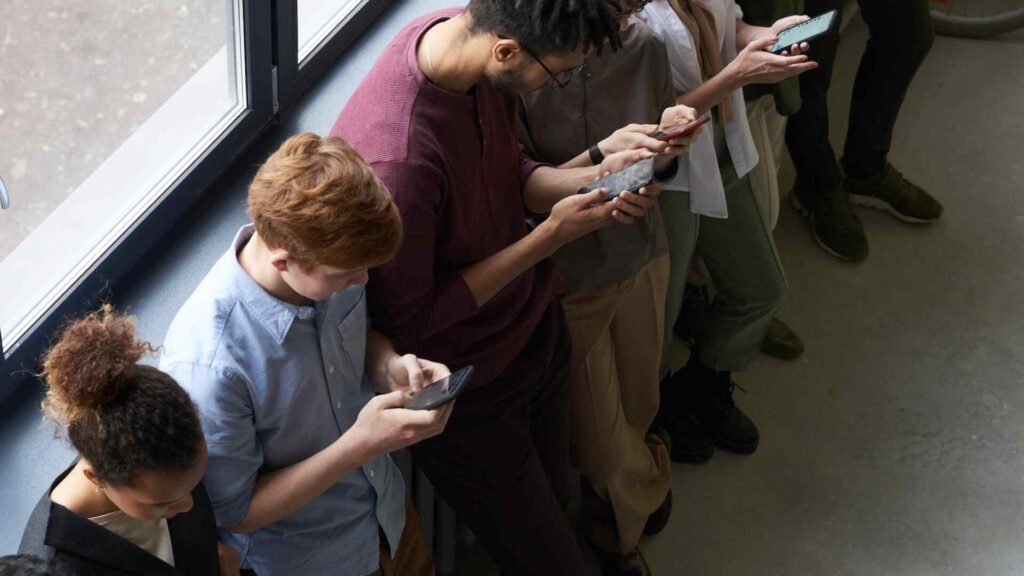The way we interact, communicate, and share experiences has been completely transformed by social media. While it brings numerous benefits, it also poses certain challenges, particularly concerning mental health. Let’s examine the impact of social media on depression, how its use can increase the risk of depression, identify those who are at risk, recognize symptoms and signs related to social media use, and examine the detrimental effects on mental health.
Finally, gain helpful advice for developing positive social media habits to promote improved mental well-being.
Table of Contents
How Social Media Contributes to Depression
When it comes to depression, social media can be a double-edged sword. On the one hand, it provides a platform for social engagement and support, allowing people to connect with friends, family, and other people in similar situations. It can, however, lead to feelings of inadequacy and social comparison.
Consider how social media can affect someone struggling with self-esteem issues. As they scroll through their feed, they are bombarded with images of friends and acquaintances seemingly living perfect lives. This constant exposure to picture-perfect moments can trigger envy and self-doubt, leading to a negative impact on their self-esteem and potentially fueling depression. Another way social media can unintentionally worsen depression is by magnifying feelings of isolation and loneliness. In an effort to seek validation, individuals often present an idealized image of themselves, hiding their vulnerabilities and struggles. This can make their true emotions and challenges remain hidden, worsen their feelings of isolation.
It is important to recognize that social media offers only a curated representation of reality, not a comprehensive portrayal of one’s entire life. However, the lines between virtual and real-world interactions can sometimes blur, causing individuals to place unwarranted emphasis on their online persona.
Who Is at Risk

While social media can have a negative impact on individuals across the board, certain groups are particularly susceptible to its effects. Young individuals, for example, often face intense pressure to stay connected and maintain a social media presence, which can result in spending excessive amounts of time online. Additionally, individuals who are already experiencing symptoms of depression may be more vulnerable to the detrimental effects that social media can have on their mental health.
Here are some groups of people who may be at higher risk of experiencing negative effects of social media on mental health:
- Young people: Adolescents and young adults who are still in the process of developing their sense of identity may feel intense pressure to present themselves in a certain way online. This pressure can lead to anxiety, depression, and other negative mental health outcomes.
- Individuals with pre-existing mental health conditions: Social media can trigger or increase symptoms of depression and other mental health conditions. Individuals who are already experiencing such conditions may be more vulnerable to the negative effects of social media.
- People who spend excessive time on social media: Spending excessive time on social media can lead to various negative mental health outcomes. These individuals may be more likely to feel stressed, anxious, or depressed.
- People who spend excessive time on social media: Spending excessive time on social media can lead to various negative mental health outcomes. These individuals may be more likely to feel stressed, anxious, or depressed.
- Individuals who have experienced cyberbullying: Cyberbullying is a serious issue that can have lasting effects on mental health. Those who have experienced cyberbullying may be at higher risk of developing depression and other mental health conditions.
Signs and Symptoms of Depression Related to Social Media
Depression brought on by social media use can manifest in many ways. Some signs and symptoms include a decrease in social interactions, frequent mood swings, heightened irritability, obsessive checking of notifications, and sleep disturbances.
Here are some signs and symptoms of depression related to social media:
- Increased Social Withdrawal: Individuals experiencing depression related to social media may exhibit a tendency to withdraw from in-person interactions and prefer spending excessive amounts of time on social media platforms. This retreat from real-life connections may be a way to escape feelings of inadequacy and social comparison.
- Frequent Mood Swings: Social media interactions can make people emotionally vulnerable, which can cause frequent mood swings. When reading through upbeat messages, those who are depressed may feel happy one minute, but then get depressed the next when they come across triggering or negative information.
- Heightened Irritability: Individuals suffering from social media depression may become irritable when presented with content that violates their ideas or ideals. This emotional reaction may be motivated by a desire to shield themselves from thoughts of inadequacy or vulnerability.
- Obsessive Checking of Notifications: For many individuals, social media can become an addictive behavior, leading to an obsession with checking notifications and scrolling through feeds. Those experiencing depression may find themselves engaging in these behaviors as a coping mechanism, leading to a cycle of negative mood states. It can lead to feelings of disappointment and worthlessness when we fail to receive the validation and attention we crave, causing like-seeking behavior.
- Sleep Disturbances: Depression can lead to disruptions in sleep patterns, including difficulties falling or staying asleep. Social media use can exacerbate this issue, with increased exposure to blue light from screens and addictive engagement in scrolling through timelines and feeds. Those experiencing depression may find themselves staying up late to interact with social media, leading to exhaustion and an increasing cycle of negative mood states.
Negative Effects of Social Media on Mental Health
While it social media offers countless benefits, it is important to recognize the negative effects it can have on our mental health. One significant impact is the rise of unrealistic expectations, which stems from constant exposure to perfectly curated profiles and highlight reels.
As we scroll through our feeds, we often find ourselves comparing our own lives to these seemingly flawless portrayals of others. Witnessing friends and acquaintances pursuing their dreams, globetrotting, and seemingly achieving endless success can trigger feelings of inadequacy and diminish our self-worth. This perpetual comparison can even contribute to depression, as we struggle to measure up to the edited versions of others’ lives.
Imagine seeing pictures of peers living their best lives, seemingly without any struggles or setbacks. It is easy to forget that social media captures only carefully selected moments, creating a distorted perception of reality. We might find ourselves feeling unfulfilled and unsatisfied with our own lives, as we fail to see the behind-the-scenes challenges and hard work that others face.
Additionally, the Fear Of Missing Out (FOMO) is another common negative impact of social media. As we browse through posts, we can’t help but feel an endless need to keep up with others’ apparently interesting and exciting lives. This fear of missing out leads to feelings of loneliness, jealousy, and a skewed view of our own lives, as we compare ourselves to the highlight reels of others.
Remember, nurturing our mental well-being in the digital age is an ongoing journey of self-awareness and self-compassion. By being mindful of the influence of social media, we can navigate the digital landscape with resilience and grace, embracing the positive aspects while safeguarding our mental health.
Healthy Social Media Habits for Mental Well-being

Before you dive into the social media rabbit hole, take a moment to define your purpose for using these platforms. Are you looking to stay informed, connect with friends and family, or explore your passions and interests? Having a clear intention can help you navigate social media with focus and avoid getting caught up in endless scrolling.
Endless scrolling can consume valuable time and negatively impact your mental well-being. Set specific time limits for social media usage each day. Resist the temptation to check your feed as soon as you wake up or before going to bed. Create a digital-free zone during meals, family gatherings, or personal downtime.
Take control of your feed by curating it with content that enriches your life and fosters positivity. Unfollow accounts that consistently trigger negative feelings or promote unrealistic standards. If certain accounts make you feel inadequate or anxious, unfollow them and seek out profiles that promote self-love, body positivity, and personal growth.
Prioritize authentic connections by engaging in meaningful conversations and expressing genuine interest in others’ lives. Building supportive relationships online can provide a sense of belonging and strengthen your mental well-being. Reach out to friends, both old and new, through direct messages, voice chats, or video calls. Share personal experiences, joys, and challenges, and listen actively when others do the same.
Our minds need breaks from the digital world too. Regularly disconnect from social media to recharge and focus on activities that bring joy and fulfillment. Designate one day each week as a “digital detox day.” Spend this time engaging in hobbies, going for nature walks, reading, or spending quality time with loved ones.
Become aware of your emotions and reactions while using social media. If you notice feelings of envy, anxiety, or sadness, take a step back and assess why those emotions arise. Mindfulness can help you gain perspective and develop a healthier relationship with social media.
Remind yourself that social media only shows curated glimpses of people’s lives and doesn’t reflect their complete reality.
Final Thoughts
If you regularly experience issues that affect your mental health, seeking the help of a mental health professional is advisable.
Qualified therapists and counselors can provide valuable guidance and tools to navigate the complexities of social media’s impact on mental health. They can help you explore the root causes of negative emotions triggered by social media, develop coping strategies, and build resilience to manage these challenges effectively. Remember, seeking help is a sign of strength, and a trained mental health professional can support you in finding balance and well-being in both your online and offline life.
You don’t have to face these challenges alone. Support is available to help you thrive in the digital world while safeguarding your mental health.
Ready to Make Change?
If any piece of this resonates with you, and you are ready to become more intentional about how your relationship and conflict, reach out to me at naami@centericc.com



